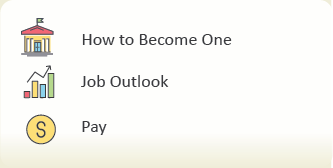An official website of the United States government
 United States Department of Labor
United States Department of Labor
| May 2023
For more information and data, including:

Learn more about this occupation in the Occupational Outlook Handbook.
I help people fulfill their goals of buying and selling real estate.
A typical day starts in the office, working on existing deals and activities for connecting with people to grow the business. I may meet with new clients about their real estate goals or with existing clients to identify properties they might be interested in.
Away from the office, I might meet clients at a property and tour it with them. I also may need to be available at open houses on Saturdays and Sundays to answer questions and show the property for clients who are selling their home.
Before I visit a property with clients, I research it to look for areas of concern, such as the age of the HVAC (heating, ventilation, and air conditioning) system or the roof. I also complete a comparative market analysis based on similar properties that have recently sold in the area. I’m responsible for keeping copies of all my contracts, internal company paperwork, and other documents.
Real estate agents wear many hats. For example, I may spend part of my day meeting with a marketing firm to put together postcards, fliers, or social media advertisements. Or I might write a buyer-offer letter for a client who’s making an offer on a property.
I worked in retail after college as I considered opportunities. My aunt is a Realtor, so I knew about the business from her. I continued working during the day and took the 60-hour real estate licensing class in the evenings to see if it was something I was interested in. After I got my license, I was so energized and excited that I gave 2 weeks’ notice for my retail job.
I joined a local real estate company, where I had a mentor who helped and trained me. I would accompany my aunt, mentor, or other real estate agents when meeting buyers, going to listing appointments, and showing properties. Shadowing taught me different facets of the business, such as learning about neighborhoods and identifying potential issues with homes.
One surprise has been how involved you are in the process and how emotional that can be. For example, you might be involved with multiple generations selling the home of a loved one who has passed.
Other surprises have been related to the actual homes, such as finding a problem with a house during the final walkthrough. But most surprises have less to do with the homes than with the people. I’ve been in a situation where a seller only wants to be contacted every 2 weeks and won’t respond even if the property has multiple offers.
You have to be patient, persistent, and organized. Patient, as you’re working with people and with sales that don’t happen right away or as fast as you may hope. Persistent, because you’re accountable to yourself and for making sure you work. As a real estate agent, you make your own schedule. You have to be organized, especially with blocking your time and keeping a calendar.
Being able to have a positive mindset is also key. Sellers won’t accept every offer you submit on behalf of your clients, and not every sale will be easy. There will be some trial and error involved with putting yourself out there, meeting people, and learning the process.
For someone starting out, I would suggest finding a mentor. Your first sale isn’t going to happen in 30 days, so come in with a budget and learn as much as possible from the right people who are already succeeding in this business. Also, make sure to get involved in company training.
Let everyone know what you do. Don’t be a secret agent. Some of the best real estate agents are not extroverts but are very good at staying in contact with their network and letting them know what they can do for them.
You should mentally prepare to get out of your comfort zone. This can be a challenging business. Every day and every deal is different, so you have to be quick on your feet.
Finding new clients. Like a reporter has to find a new story every day, a real estate agent is always looking for new clients.
I’m fortunate that a lot of my business comes from referrals. I have repeat clients and clients who refer friends and family. I also network with communities that I’m a part of. I’m proactive and maintain relationships with people who might refer me in the future. In my experience, people want to do business with someone they know and trust. For that reason, I do some geographical target marketing in neighborhoods near where I live and spend my free time.
I like interacting with people and helping them through what can be a stressful process. I also like to be on the go because I don’t like sitting at a desk all day.
No 2 days are alike, and I enjoy that. I like meeting people from all walks of life and cultures—so many different people that I normally wouldn’t have the chance to meet.
Ryan Farrell, "Real estate agent," Career Outlook, U.S. Bureau of Labor Statistics, May 2023.